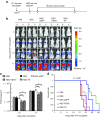Systemic delivery of fusogenic membrane glycoprotein-expressing neural stem cells to selectively kill tumor cells
- PMID: 23752308
- PMCID: PMC3734663
- DOI: 10.1038/mt.2013.123
Systemic delivery of fusogenic membrane glycoprotein-expressing neural stem cells to selectively kill tumor cells
Abstract
Intravenously injected neural stem cells (NSCs) can infiltrate both primary and metastatic tumor sites; thus, they are attractive tumor-targeting vehicles for delivering anticancer agents. However, because the systemic distribution of the injected NSCs involves normal organs and might induce off-target actions leading to unintended side effects, clinical applications of this approach is impeded. Given that the vesicular stomatitis virus glycoprotein (VSV-G) can promote the formation of multinucleated syncytia to kill cells in a pH-dependent manner, we engineered a pH sensor of VSV-G and generated a novel VSV-G mutant that efficiently promotes syncytium formation at the tumor extracellular pH (pHe) but not at pH 7.4. Using transduced NSCs derived from induced pluripotent stem cells (iPSCs), the VSV-G mutant was delivered into mice with metastatic breast cancers in the lung through tail vein injection. Compared with the conventional stem cell-based gene therapy that uses the herpes simplex virus thymidine kinase (HSVtk) suicide gene, this treatment did not display toxicity to normal non-targeted organs while retaining therapeutic effects in tumor-bearing organs. Our findings demonstrate the effectiveness of a new approach for achieving tumor-selective killing effects following systemic stem cell administration. Its potential in stem cell-based gene therapy for metastatic cancer is worthy of further exploration.
Figures





Similar articles
-
Tumor tropism of intravenously injected human-induced pluripotent stem cell-derived neural stem cells and their gene therapy application in a metastatic breast cancer model.Stem Cells. 2012 May;30(5):1021-9. doi: 10.1002/stem.1051. Stem Cells. 2012. Retraction in: Stem Cells. 2019 Nov;37(11):1492. doi: 10.1002/stem.3066. PMID: 22311724 Retracted.
-
Glioma gene therapy using induced pluripotent stem cell derived neural stem cells.Mol Pharm. 2011 Oct 3;8(5):1515-24. doi: 10.1021/mp200127u. Epub 2011 Jul 22. Mol Pharm. 2011. Retraction in: Mol Pharm. 2019 Sep 3;16(9):4088. doi: 10.1021/acs.molpharmaceut.9b00837. PMID: 21755959 Retracted.
-
Induced pluripotent stem cell-derived neural stem cells transduced with baculovirus encoding CD40 ligand for immunogene therapy in mouse models of breast cancer.Hum Gene Ther. 2014 Aug;25(8):747-58. doi: 10.1089/hum.2013.160. Epub 2014 Jun 20. Hum Gene Ther. 2014. PMID: 24773154
-
Concise Review: Neural Stem Cell-Mediated Targeted Cancer Therapies.Stem Cells Transl Med. 2018 Oct;7(10):740-747. doi: 10.1002/sctm.18-0003. Epub 2018 Aug 21. Stem Cells Transl Med. 2018. PMID: 30133188 Free PMC article. Review.
-
Stem cell based cancer gene therapy.Mol Pharm. 2011 Oct 3;8(5):1480-7. doi: 10.1021/mp200151a. Epub 2011 Jul 25. Mol Pharm. 2011. PMID: 21755953 Review.
Cited by
-
Application of Induced Pluripotent Stem Cell-Derived Models for Investigating microRNA Regulation in Developmental Processes.Front Genet. 2022 May 26;13:899831. doi: 10.3389/fgene.2022.899831. eCollection 2022. Front Genet. 2022. PMID: 35719367 Free PMC article. Review.
-
Tumor cell membrane-based vaccines: A potential boost for cancer immunotherapy.Exploration (Beijing). 2024 Mar 28;4(6):20230171. doi: 10.1002/EXP.20230171. eCollection 2024 Dec. Exploration (Beijing). 2024. PMID: 39713208 Free PMC article. Review.
-
Xenogenization of tumor cells by fusogenic exosomes in tumor microenvironment ignites and propagates antitumor immunity.Sci Adv. 2020 Jul 1;6(27):eaaz2083. doi: 10.1126/sciadv.aaz2083. Print 2020 Jul. Sci Adv. 2020. PMID: 32937446 Free PMC article.
-
Directing and Potentiating Stem Cell-Mediated Angiogenesis and Tissue Repair by Cell Surface E-Selectin Coating.PLoS One. 2016 Apr 22;11(4):e0154053. doi: 10.1371/journal.pone.0154053. eCollection 2016. PLoS One. 2016. PMID: 27104647 Free PMC article.
-
Yeast Actin-Related Protein ARP6 Negatively Regulates Agrobacterium-Mediated Transformation of Yeast Cell.Biomed Res Int. 2015;2015:275092. doi: 10.1155/2015/275092. Epub 2015 Sep 6. Biomed Res Int. 2015. PMID: 26425545 Free PMC article.
References
Publication types
MeSH terms
Substances
LinkOut - more resources
Full Text Sources
Other Literature Sources

